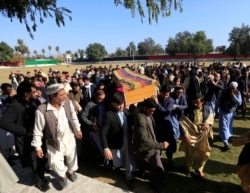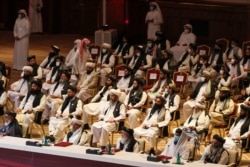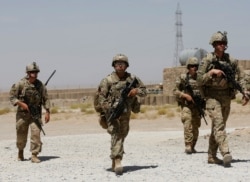The United States has directly accused the Taliban of being behind a recent wave of high-profile assassinations in Afghanistan, urging the insurgent group to stop the violence “for peace to succeed.”
Monday’s charges came hours after the Taliban accused U.S. forces of launching airstrikes against insurgent-held areas in violation of their 2020 bilateral agreement aimed at ending the long-running Afghan war.
The controversy erupts as insurgent leaders and representatives of the U.S.-backed Afghan government are due to reconvene in Qatar Tuesday for a next round of peace negotiations.
A spokesman for U.S. forces in Afghanistan rejected as “false” allegations they violated the agreement with the Taliban.
Col. Sonny Leggett stressed in a statement Monday the U.S. military has been “clear and consistent” in its resolve to defend Afghan security forces against Taliban attacks.
“We renew our call for all sides to reduce violence,” Leggett said on Twitter. “The Taliban's campaign of unclaimed attacks & targeted killings of government officials, civil society leaders & journalists must also cease for peace to succeed.”
The Taliban's accusations the US violated the US-TB agreement are false. US Forces have been clear & consistent: We will defend Afghan forces against TB attacks. We renew our call for all sides to reduce violence. @Zabehulah_M33 1/2
— USFOR-A Spokesman Col Sonny Leggett (@USFOR_A) January 4, 2021
This is the first time Washington has blamed the Taliban for weeks of largely unclaimed attacks in the Afghan capital, Kabul, and elsewhere in the conflict-torn South Asian nation.
The violence has over the past two months claimed the lives of at least five journalists, a provincial deputy governor, civilian society activists and a renowned election observer.
Islamic State militants have claimed responsibility for some of the attacks, though the Afghan government has accused the Taliban of being behind all of them.
For their part, insurgents have denied involvement and instead alleged the violence is the work of so-called "spoilers” within Afghan security institutions to subvert the U.S.-initiated peace process.
Earlier Monday, the Taliban issued a statement accusing U.S. troops of repeatedly carrying out airstrikes on insurgent-held areas in Kandahar, Nangarhar and Helmand provinces “over the past few days” in support of Afghan security forces.
Taliban spokesman Zabihullah Mujahid insisted the airstrikes have hit targets in “non-military zones” in violations of their February 29, 2020, agreement with the U.S.
US airstrikes against Mujahideen in Nangarhar, Kandahar and Helmand violate agreementhttps://t.co/7ldXB9a5VD pic.twitter.com/id5cJP5Xoi
— Zabihullah (..ذبـــــیح الله م ) (@Zabehulah_M33) January 4, 2021
Mujahid demanded the U.S. military immediately halt the air raids and warned the Taliban “will be forced to respond seriously, and all responsibility shall fall squarely on American shoulders."
The U.S.-Taliban agreement has stopped insurgent attacks against U.S. and NATO-led allied troops in Afghanistan. It has also initiated direct peace talks between the Taliban and Afghan government in September.
The so-called intra-Afghan negotiations will resume Tuesday in the Qatari capital of Doha, where the Taliban maintains its political office.
President Donald Trump’s special envoy for Afghanistan reconciliation, Zalmay Khalilzad, on Monday described as “unacceptable” the current level of violence, including targeted killings.
“Those perpetuating the violence seek to undermine the peace process and the country's future. They do not reflect the will of the Afghan people, who yearn for peace,” Khalilzad said on Twitter.
1/3 I return to Doha and the region with expectations that the parties will make tangible progress in the next round of #Afghanistan Peace Negotiations.
— U.S. Special Representative Zalmay Khalilzad (@US4AfghanPeace) January 4, 2021
The U.S. envoy, who negotiated and signed the February deal with the Taliban, made the remarks on his latest trip to the region, including Doha, to push forward the Afghan peace process.
“I return to Doha and the region with expectations that the parties will make tangible progress in the next round of Afghanistan Peace Negotiations,” he said.
Khalilzad reiterated his call for both Afghan rivals to quickly reach an agreement on a political settlement and an “immediate significant” reduction in violence or a cease-fire.
The U.S. has started a “conditions-based” phased withdrawal of U.S. troops from Afghanistan under the deal with the Taliban, which requires all U.S. and NATO-led allied forces to be out of the country by May 2021.
U.S. Secretary of State Mike Pompeo acknowledged last week that since the signing of the deal, U.S. soldiers have suffered no deaths in Afghanistan. He said Trump’s peace initiative also has made “incredible progress” toward ending years of Afghan hostilities.
“No U.S. servicemen have been killed in Afghanistan in almost a year, and Afghans are finally discussing peace and reconciliation among themselves. Such incredible progress,” Pompeo said in a series of tweets.
The United States had fewer than 13,000 troops in Afghanistan at the start of 2020. But that number has been significantly reduced since the deal with the Taliban, and there will be around 2,500 U.S. forces left in the country by the middle of this month.







